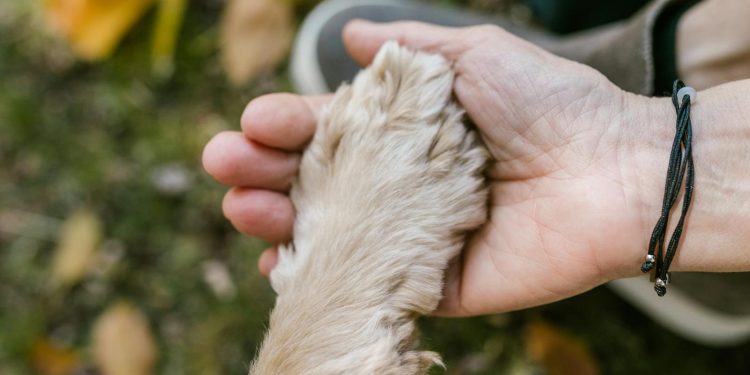A dog’s skin is not only their largest organ but also a critical indicator of their overall health. A shiny, well-conditioned coat is often the result of a healthy lifestyle, proper nutrition, and regular grooming. When your dog’s skin and coat are well cared for, it provides a barrier against infections, pests, and environmental elements. Whether your furry friend is prone to dryness, itching, or other skin issues, there are a variety of ways to maintain their skin health. Here’s a detailed guide to keeping your dog’s skin healthy and ensuring they stay comfortable and happy.
1. Balanced Diet: The Foundation of Skin Health
A balanced diet plays a vital role in your dog’s skin and coat health. High-quality pet food containing the right blend of proteins, healthy fats, vitamins, and minerals is essential. Omega-3 and Omega-6 fatty acids, in particular, are known to improve skin elasticity, reduce inflammation, and give a natural shine to the coat. These nutrients are typically found in fish oils and flaxseed oil, which can easily be incorporated into your dog’s diet. Always consult your veterinarian before adding supplements to ensure it is appropriate for your pet’s specific needs.
2. Regular Grooming for a Healthy Coat
Regular grooming is about more than just keeping your dog looking clean and neat. Brushing your dog’s coat helps distribute natural oils throughout their fur, preventing dryness and reducing shedding. It also helps to remove dirt, dead hair, and potential allergens that can lead to skin irritation. Depending on your dog’s breed, grooming frequency may vary—some dogs may need daily brushing, while others may only require a few times a week. Choose the right grooming tools, such as a slicker brush or a comb, suitable for your dog’s coat type to prevent any damage to their skin.
3. Use the Right Bathing Products
Bathing is an important aspect of skin health, but using the wrong products can do more harm than good. Always use dog-specific shampoos that are free from harsh chemicals and artificial fragrances. Human shampoos can disrupt your dog’s natural skin pH balance, leading to irritation and dryness. Opt for hypoallergenic or moisturizing shampoos for dogs with sensitive skin. Additionally, avoid over-bathing your dog, as excessive washing can strip away natural oils, leaving their skin dry and prone to irritation. Bathing once every month or two, or as recommended by your vet, is often sufficient unless your dog gets particularly dirty.
4. Keep an Eye on Hydration
Adequate hydration is essential for keeping your dog’s skin moisturized. Just like us, dogs can suffer from dry skin if they do not get enough water. Make sure your dog always has access to fresh water, especially during the hotter months or after exercise. You can also add wet food to your dog’s diet to boost their hydration levels, which in turn supports their skin and overall health.
5. Protect Against Parasites
Fleas, ticks, and mites are common culprits when it comes to skin problems in dogs. Parasites can lead to itching, redness, and even infections if left untreated. Use preventive treatments such as flea collars, topical spot-on treatments, or oral medications to protect your dog from parasites. Regularly check your dog’s skin, especially after outdoor activities, to catch any signs of infestation early. If your dog develops a skin reaction or you notice excessive scratching, consult your veterinarian for the appropriate treatment.
6. Provide a Comfortable Environment
Environmental factors such as extreme temperatures, allergens, and dry indoor air can affect your dog’s skin. During winter, the air tends to be drier, which can lead to dry skin in dogs. Using a humidifier in your home can help maintain moisture in the air, keeping your dog’s skin from becoming flaky and itchy. During the summer, protect your dog from prolonged sun exposure, as it can cause sunburn, especially in dogs with lighter or thinner coats. Creating a comfortable environment goes a long way in preventing skin issues related to weather changes.
7. Be Aware of Allergies
Allergies are a common cause of skin issues in dogs, and they can result from various sources such as food, pollen, dust, or certain grooming products. Symptoms of allergies in dogs can include itching, redness, and excessive licking. Identifying and eliminating allergens is key to keeping your dog’s skin healthy. Consult your veterinarian if you suspect your dog has an allergy—they may recommend an elimination diet or allergy testing to determine the root cause. Additionally, consider hypoallergenic dog food for pets with food sensitivities.
8. Coconut Oil: A Natural Moisturizer
Coconut oil is a popular natural remedy for dry or irritated skin. Applying a small amount of coconut oil to your dog’s skin can help soothe itchiness and improve moisture levels. You can also add a teaspoon of coconut oil to your dog’s food, but be cautious—since coconut oil is high in fat, it’s important to use it sparingly, especially for dogs prone to weight gain. Always discuss new supplements with your vet to ensure they’re suitable for your dog.
9. Avoid Exposure to Harsh Chemicals
Dogs are curious creatures, and they often come into contact with different substances during their adventures. Harsh cleaning chemicals, pesticides, and even some lawn treatments can cause skin irritation or allergic reactions. Whenever possible, use pet-friendly cleaning products in your home and make sure your dog avoids treated lawns and gardens. If your dog has come into contact with something potentially irritating, give them a gentle bath with a soothing shampoo.
10. Keep Stress Levels Low
Just like humans, dogs can experience stress, and stress can manifest through skin issues such as excessive shedding or licking. A change in routine, new environments, or the absence of a familiar person can all contribute to anxiety in dogs. Ensure your dog has a predictable routine, regular exercise, and enough mental stimulation to keep stress at bay. Consider providing toys, training exercises, or calming aids to help your dog feel more comfortable. Reducing stress can improve both their mental health and skin condition.
11. Consult Your Vet About Supplements
There are numerous natural supplements available that can help support skin and coat health. Omega-3 fatty acids, as mentioned earlier, are great for skin health, but there are other options such as biotin and vitamin E that can be beneficial as well. Biotin is known for promoting skin hydration, while vitamin E has antioxidant properties that can protect the skin from damage. Speak to your veterinarian about what supplements may be helpful for your dog, especially if they have recurring skin problems.
12. Regular Health Checkups
Regular vet checkups are essential for early detection of skin problems and any underlying health conditions that may affect your dog’s skin. Some skin issues may be indicative of hormonal imbalances or autoimmune conditions, which require medical intervention. By keeping up with routine health checks, you can stay ahead of any issues and ensure your dog remains in optimal health.
Your dog’s skin and coat health is a reflection of their overall well-being. From a balanced diet to regular grooming and environmental care, there are many steps you can take to keep your furry friend’s skin in top shape. By providing proper care and attention, you can ensure that your dog remains comfortable, healthy, and full of life—ready for every adventure that comes your way.









Discussion about this post